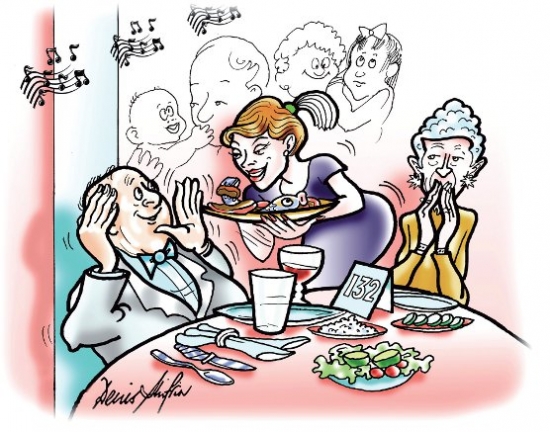
Last week I went to the wedding … again.
When two people decide to get married and want to celebrate their happy day with close friends and immediate family, that's just lovely. When it happens or will happen to one of my own, I will be delighted and look forward to the day. But when it is the turn of the granddaughter of a friend from work, or the grandson of a neighbor, or anybody else whom I have never met in my life and will probably never meet again, I ask myself why the big show, why was I invited, and why did I accept the invitation and attend?
Last week the wedding was held in the same garden venue, with the same 300-500 totally anonymous other invitees. With the exception of the mother of the host and hostess, who had invited us, I didn't know a soul there. The same selection of warm canapés, the same glass of indifferent white wine, the same searching in vain for a friendly face from some stage of my reasonably variegated life, the same one-hour wait after the advertised time for the ceremony to begin. The same curious waiting to know if the performance will be led by Rabbi A or Rabbi B; the serious seeker after wayward souls or the condescending clown out to elicit a few laughs from his captive audience.
The same ecstatically happy bride and groom and their slightly less ecstatic parents, whom I observe glancing from obscure face to obscure face as if wondering who had invited them and how much these strangers were going to cost them.
Then the same meal for which I had no appetite. After all, I had filled up to excess on all those canapés during the waiting hour, so that even the tastiest of entrées could have found no place within me. It was sad to contemplate the quantity of food that would be discarded at the end of the evening or recycled for the following evening's function. The same lame attempt at conversation with table companions. The same video screening of scenes from the childhoods of bride and groom, and then the same interminable dancing to music chosen by and reflecting the tastes of the young couple. At least the style and volume of the music obviated the need to make more polite conversation with total strangers. Finally, the same difficult decision about how soon I could reasonably leave without giving offense.
Why the show? Was it really the wish of the young couple to be surrounded by hoards of relatively elderly strangers on their happy day, or was it the wish of their parents to advertise their own social status, to reciprocate for past invitations received or to avoid the risk of offending those who felt entitled to be invited by virtue of their (sometimes distant) relationship with the hosts? Was the size and scope of the event determined by the wish to match or exceed extravaganzas previously organized by members of their peer group? Did anybody, apart from the closest relatives and friends, enjoy the evening, as opposed to just feeling happy for the couple and their immediate family? Would it really have made any difference, or been more worthwhile, if the event had been truly different or spectacular or otherwise memorable? Is the mark of a successful event measured by the length of time people remember it and recall it, or by the degree to which the invitees had a genuinely good time?
Why was I invited? In some cases it is merely a question of being "the husband of." Otherwise, I suppose it just could be that the person who invited me really likes me and wanted me to be there. Or maybe I was invited in the genuine, even if mistaken, belief that I enjoy such events or that I would be insulted if not invited. Perhaps I got the invitation as a courtesy, without any real expectation that I would actually come. Maybe it was just to make up numbers, since many wedding venues charge for a minimum number of guests irrespective of how many show up.
Why did I accept the invitation? In cases where my wife is the true invitee and she wants to attend, I don't have a real choice. Otherwise, it is probably because I am a prisoner of social expectations. If I refuse without good cause, I fear to give offense. Pleading another engagement is insulting. Maybe I feel guilty refusing in the knowledge that the hosts have invested a small fortune and may be counting on me to make up a fraction of the deficit with the envelope I will leave at the door. The only safe reason for not showing up is to be genuinely laid out with the flu or worse, and proving it by telephoning a stuffy-nosed, coughing, sneezing apology followed up by sending a reasonably modest check in the mail.
Is there any way to break this vicious circle of grandiose extravagance for the unappreciative majority? I was recently not invited to two weddings, and I couldn't have been happier. In the first case, my wife's niece, of whom I am genuinely fond, decided to get married abroad in the company of her parents, brothers and a few of their closest friends. Money was not an issue; this is how the young couple wanted to do it, and I truly appreciated their decision. In the second case, a billionaire acquaintance hired the Palace of Versailles for his daughter's nuptials, and arranged for a fleet of private jets to fly in his guests, including royals, to a celebrity-studded extravaganza lasting several days and nights. Being decidedly un-royal and a genuine non-celebrity, I was delighted not to find myself on the list.
I have two unmarried children. I cannot foresee what will be, but I can at least hope that their eventual decisions about their own wedding ceremonies will reflect my own feelings on the subject. They will be made aware that while it will never be a question of either/or, I would prefer to invest in their future and not in an evening of questionable entertainment. If I don't manage to make my case, then I will grin and bear it and pretend that I am enjoying every moment.
 Chanukah 5773
Chanukah 5773 The Guild launches its season with The Fantasticks
The Guild launches its season with The Fantasticks My Chanukiah
My Chanukiah A School Centenary
A School Centenary Train Trips
Train Trips-1451900978.jpg) The Agunah- The Deserted Wife
The Agunah- The Deserted Wife Ilan Shachar
Ilan Shachar